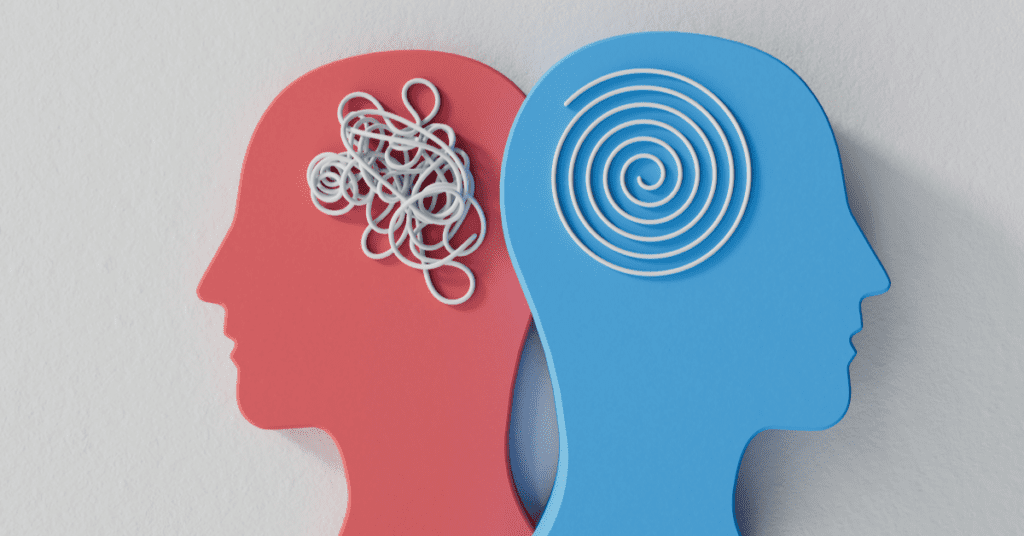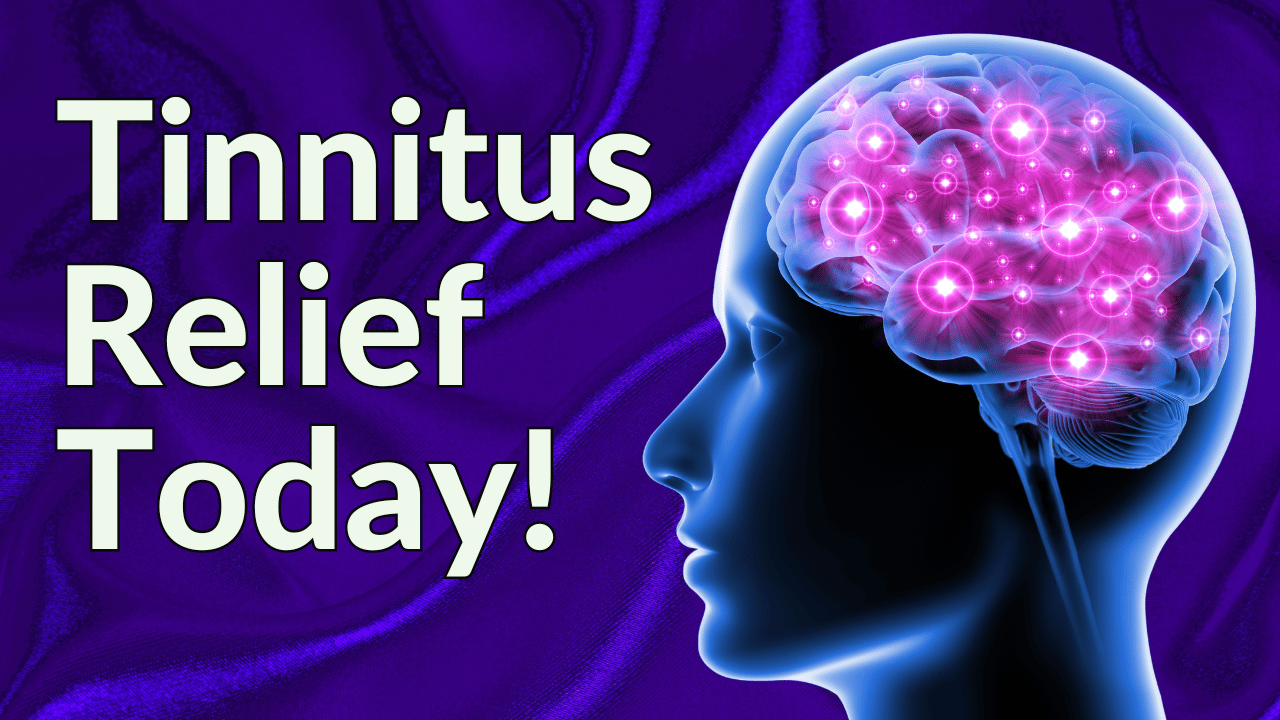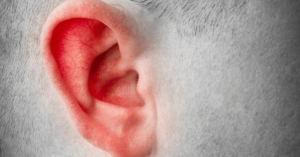For most people, tinnitus may come and go without causing much distress. But for as many as 20% of tinnitus patients, that constant ringing in the ears can have an impact on the ability to enjoy daily life.
What Is Tinnitus?
Tinnitus is defined as the perception of sound when there is no external source. Most people describe it as a ringing, but others hear a whooshing, buzzing, clicking, chirping, or other sounds.
"Treble Health helped me reduce my tinnitus by about 80%, and now I can live my life again!"

"Treble Health helped me reduce my tinnitus by about 80%, and now I can live my life again!"
– Steve D.
Book a free consultation to learn which Treble Health solution is right for you. Join Steve and thousands more who have found lasting tinnitus relief.
In almost all cases, tinnitus is subjective, meaning only you can hear the sound. But that doesn’t mean you’re imagining it. Subjective tinnitus is usually caused by hearing loss or other changes to your hearing. Without complete auditory information, your brain attempts to fill in the gaps and complete the sound. Unfortunately, this generates tinnitus, which can be intense and distracting.
The Relationship Between Tinnitus And Hearing Loss
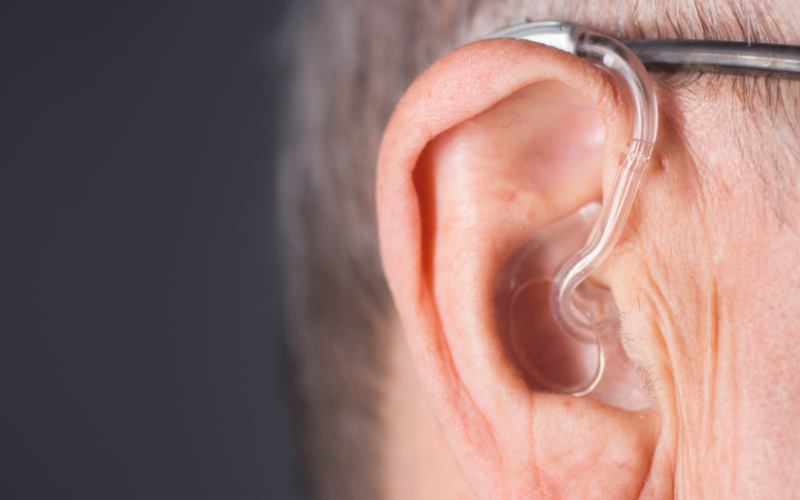
Hearing loss is one of the most common causes of subjective tinnitus. This hearing damage can be caused by:
- Age-related hearing loss (presbycusis)
- Noise-induced hearing loss
- Sudden sensorineural hearing loss
- Ear infections that impact the inner ear
- Blockages in the ear canal (such as ear wax or other foreign objects)
- Temporomandibular joint disorders (TMJ), or jaw pain
- Traumatic brain injury or other head injury
- Meniere’s disease
Various types of hearing loss exist, with the most common types being sensorineural, conductive, or a mix of both, known as mixed hearing loss. If left untreated over a long period, hearing loss can lead to chronic tinnitus.
The onset and management of hearing loss can be emotionally taxing and stressful, and these changes can exacerbate the mental strain associated with chronic tinnitus – further worsening the perception of symptoms. Therefore, it’s crucial to work with a healthcare professional to create a personalized treatment plan that not only addresses the hearing loss, but also protects your emotional and mental well-being.
Unilateral And Bilateral Tinnitus

While tinnitus is typically perceived in both ears (bilateral tinnitus), in some cases, individuals experience it in just one ear (unilateral tinnitus). Often rooted in hearing loss, those with unilateral tinnitus may have sustained more severe damage in one ear than the other. There are multiple factors that can lead to such damage, with some of the most common being ear canal blockages, infections, an injury to just one ear, or exposure to loud noise. This is commonly observed in individuals frequently using firearms, power tools, or those who have suffered a sudden sensorineural hearing loss.
How Severe Can Tinnitus Be?
Tinnitus severity doesn’t depend on the volume of the sound you hear – it’s the impact it has on your quality of life.
For some people with bothersome tinnitus, that constant sound can be distracting enough that it interferes with their ability to sleep, concentrate, or socialize. Tinnitus can even lead to anxiety, depression, or changes in your cognitive functioning, which can have a tremendous impact on your daily life.
Tinnitus Testing And Audiological Evaluations
It’s important to know that tinnitus isn’t a disease, but is usually a symptom of other conditions – some of which you may be able to treat with the help of your physician. Before starting tinnitus treatment, it is important to get a full health screening and examination done by a physician — this will allow your doctor to rule out any obvious physical problems, helping to find the root cause of your tinnitus. Treating any related health conditions may clear up your tinnitus as well.
After ruling out any underlying medical conditions, your doctor may recommend a hearing test (audiometry). An audiologic evaluation with an audiologist can help determine your level of hearing loss, if any, and assess your symptoms, while questionnaires such as the tinnitus handicap inventory (THI) can help determine your tinnitus severity. You may also be referred to an otolaryngologist – better known as an ear, nose, and throat doctor (or ENT), if necessary.
Research Exploring The Link Between Tinnitus And Mental Health

It’s well-known that tinnitus and hearing changes can impact your mental health. Tinnitus sufferers can experience psychological conditions including depressive symptoms, anxiety disorders, irritability, sleep disorders, emotional distress, and intense worry. Knowing this, researchers have dedicated numerous studies to understanding the root causes of these severe symptoms and finding ways to provide relief.
Associations Between Tinnitus And Mental Health In Middle-Aged And Elderly People
A study investigated the link between tinnitus and psychological factors like depression, anxiety, and sleep quality in a relatively large population of middle-aged and older adults. This research focused on the interference of tinnitus with daily life and the presence of hearing loss.
This study was part of the Rotterdam Study (a prospective population-based cohort of middle-aged and older persons) and has been entered into the World Health Organization International Clinical Trials Registry Platform.
Results showed that tinnitus was strongly associated with having more depressive and clinically relevant anxiety symptoms and having poorer sleep quality, even when tinnitus did not interfere with daily life. Hearing loss did not appear to play a primary role in these associations. This underlines the importance of increasing awareness that tinnitus can be related to mental health.
A 2021 study amongst a population of middle-aged and older adults explored the connection between tinnitus and psychological factors such as depression, anxiety, and sleep quality. Conducted as part of the Rotterdam Study, a prospective population-based initiative, this research was registered on the World Health Organization International Clinical Trials Registry Platform.
The focus was on the impact of tinnitus on daily living and the concurrent presence of hearing loss. The findings revealed a robust association between tinnitus and heightened symptoms of depression, clinically significant anxiety, and diminished sleep quality. Interestingly, these associations prevailed even when tinnitus did not significantly disrupt daily activities. Contrarily, hearing loss did not exhibit a primary influence on these relationships. This highlights the necessity of elevating awareness regarding the potential mental health implications of tinnitus.
The Psychological Model Of Tinnitus
The emotional impact of tinnitus depends on perspective. A new model suggests that patients’ interpretations of tinnitus and resulting behavioral changes can cause, maintain, or worsen distress. In other words, if you hold a lot of negative or upsetting thoughts about tinnitus, you may experience more severe symptoms.
Giving a lot of negative attention to tinnitus can spark more stress and make it harder to think about anything else. This can result in tinnitus patients overestimating the severity of tinnitus and give a distorted perception of their hearing.
Psychometric Evaluation
An additional study explored the psychometric evaluation of tinnitus patients seeking help for tinnitus or tinnitus with hyperacusis (physical discomfort when exposed to sounds that seem over-loud). These evaluations focused on assessing the impact of tinnitus on the patient’s day to day activities, mood, and sleep, and not on hearing difficulties.
The study used the Tinnitus Impact Questionnaire (TIQ) and found that the total TIQ score was moderately to strongly correlated with scores for the Tinnitus Handicap Inventory, Screening for Anxiety and Depression-Tinnitus questionnaire, Hyperacusis Questionnaire, and Hyperacusis Impact Questionnaire. The TIQ score was only slightly related to the pure-tone average hearing threshold (a common way to measure hearing loss). This showed that even though tinnitus is usually related to hearing loss, the patients’ actual hearing levels didn’t correlate with the severity of their tinnitus symptoms.
Age, Gender, And Marital Status In Relation To Tinnitus Distress
Although everyone’s experience with tinnitus is different, there seem to be patterns amongst certain demographic groups. Researchers explored people of different genders, ages, and even relationship statuses to dig deeper into these correlations.
Gender

One study looked into the link between tinnitus intensity and gender differences. There were no significant differences in tinnitus distress, but the way men and women handled their symptoms varied. Results showed that women with tinnitus experienced more depression, anxiety, and worry, while on the other hand, men with tinnitus showed a greater need to control their thoughts about tinnitus, which led to higher levels of distress and depressive symptoms.
Age
People of any age can develop tinnitus, however, since severe tinnitus is associated with hearing loss, it tends to be more common among older people who have developed age-related hearing loss. The levels of distress can be related to perceived tinnitus loudness, sound sensitivity, mental health, and many other factors – potentially including age.
A study of 755 normal hearing tinnitus patients completed questionnaires, and researchers found that the later in life patients developed tinnitus, the more they experienced bothersome tinnitus. Older tinnitus patients said that their symptoms seemed to appear more suddenly, and they experienced distress right from the beginning. Researchers hypothesized that since younger tinnitus patients experienced less distress, this could be linked to the natural age-related decline in neuroplasticity.
Relationships
Tinnitus may only exist “in your head,” but the symptoms can still impact those around you. It’s an emotional condition, and your well-being and ability to socialize with others may impact your relationships with loved ones. A few studies have explored spouses’ responses to tinnitus and overall marital satisfaction while one partner experienced tinnitus.
Sullivan et al. discovered that rocky marriages, marriages among people with depression, and people with highly critical spouses had trouble managing their tinnitus symptoms. Another study by Pugh et al. examined the contribution of spouse responses to tinnitus. Their results suggested that dysfunctional relationships and ignoring or punishing spouses’ complaints about tinnitus were related to anxiety and depression. These negative relationship habits led to unhealthy coping techniques and an increased tinnitus severity.
Other Factors
A broad study of over 500 tinnitus patients used multiple questionnaires to discover tinnitus severity and predict chronic tinnitus. Degrees of hearing loss, perceived loudness of tinnitus, and demographic information (like age, gender, relationship status, education, and employment) and general stress levels all had an impact on the degree of tinnitus distress.
Treatments For Tinnitus

Discovering the potential causes and factors influencing your experience with tinnitus is a good way to begin your journey toward relief. However, it’s very important to get evaluated by the appropriate healthcare professionals (physicians, audiologists, ENT, counselors, or other doctors) to create the right management technique for you.
Treating underlying conditions (like earwax blockages or ear infections) can provide immediate relief, but there is no known cure or medication that will end tinnitus for good. That said, there are some highly effective ways to treat tinnitus:
- Hearing aids. Hearing aids are often recommended for people with bothersome tinnitus and hearing loss. These devices can help restore hearing ability, and some hearing aids are even able to provide sound therapy simultaneously with hearing aid amplification providing a comprehensive treatment option for tinnitus.
- Tinnitus retraining therapy (TRT). TRT is a multifaceted approach. Combining education, counseling, and sound therapy, you can harness your emotional reactions, work toward habituation, and reduce tinnitus awareness.
- Cognitive behavioral therapy (CBT). As you know, that constant sound isn’t the only symptom of tinnitus. Managing your mental health, psychiatric disorders, or other psychological symptoms like anxiety and depression may be key to relief.
- Sound therapy. Using hearing aids, sound generators, white noise machines, and other targeted sounds can help retrain your brain to ignore tinnitus.
- Mindfulness. Being purposely aware of your sounds, sensations, and surroundings through mindfulness can help you rewire your thought patterns and find peace with tinnitus.
- Lifestyle changes. Eating well, staying active, monitoring your medications, managing health conditions, and staying well-hydrated aren’t just good for you. These healthy habits can help ease tinnitus symptoms.
There is no one-size-fits-all solution to tinnitus. You may wish to explore multiple techniques or even combine them to find relief. The most important part is to find ways to live your life to the fullest – with or without tinnitus.
Other Tinnitus Treatments
Although the American Tinnitus Association acknowledges that there are currently no FDA-approved drugs specifically for tinnitus, there may be medications that can help.
Pharmacological treatment for the stress, insomnia, anxiety, depression, and other psychiatric symptoms that cause (or worsen) tinnitus perception may help you find relief. Some people feel better with:
- Antidepressants and anti-anxiety medications
- Antihistamines, anticonvulsants, and anesthetics
- Alternative medicines, herbal remedies, and supplements
There is no concrete evidence that alternative remedies have any effect on tinnitus, and treating tinnitus with medication would be considered “off-label.” Researchers are looking into pharmacological treatments for tinnitus, but always talk to your doctor before taking or changing any medications. Be sure to mention any alternative medicines, since these can impact your health and other medications.
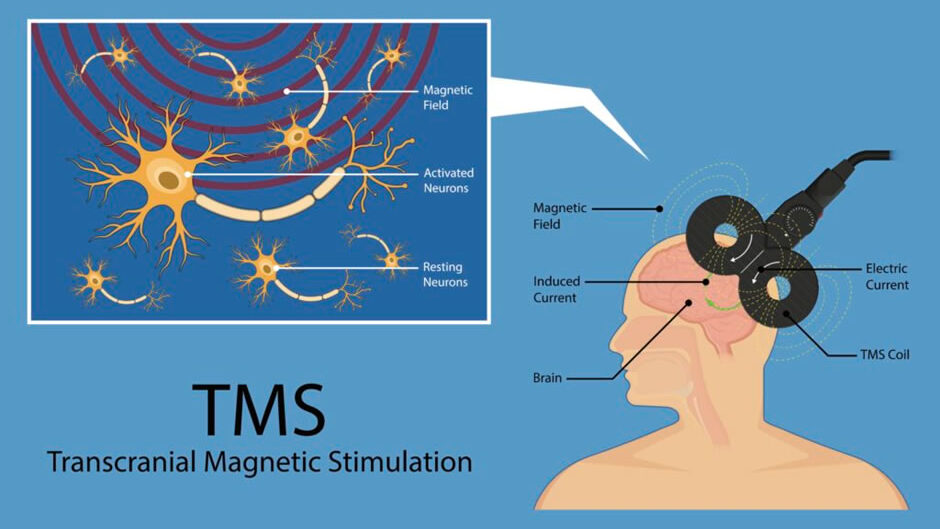
Researchers are learning more and more about tinnitus and the related brain regions and nerves. Non-invasive neuromodulation is a promising new technology that may help kickstart your mind’s perception of tinnitus. Examples of non-invasive brain stimulation include transcranial magnetic stimulation, transcranial electrical stimulation, alternating current stimulation, transcranial random noise stimulation, transcutaneous vagus nerve stimulation, bimodal combined auditory and somatosensory stimulation. Bimodal stimulation triggers the tongue, face, or neck to redirect the firing of nerves in the brain during tinnitus.
Treble Health Can Help

Regardless of the origin or type of tinnitus that you have, Treble Health is here to assist. Our team of audiologists have decades of experience working with tinnitus patients, and finding relief is within reach. If you have any questions regarding tinnitus treatment, we encourage you to schedule a complimentary telehealth consultation with our tinnitus specialists to discover the ways we can assist you on your journey to tinnitus relief. This free, 20-minute Zoom call, is a no-obligation opportunity to get personalized advice and answers to all your questions about tinnitus. Our audiologists can provide valuable insights into managing your condition, helping you to feel empowered in your journey toward tinnitus relief.
Next Step: Book Free Consultation
- 75% of patients reduced their tinnitus within three months after following our recommendations.
- "I feel like Treble Health literally gave me my life back." - Randy S. (verified customer)
- Join thousands of people who have reduced their tinnitus after scheduling a free consultation.





